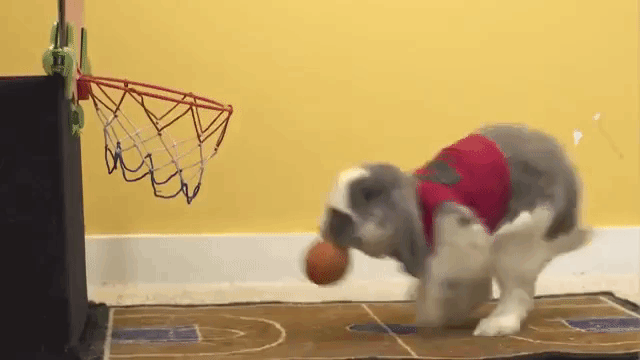"The March Hare will be much the most interesting, and perhaps as this is May it won't be raving mad – at least not so mad as it was in March." ~ Alice, not ten feet tall at the moment, about to tea with the Mad Hatter, the March Hare, and the Dormouse. Spoiler: They're all mad all the time, except for Dormouse, who's only mad when awake. BTV mascot nomination forthcoming. Any seconds for Dormouse?
| Bini, the Guinness World Record holder for Most Dunks by a Rabbit in One Minute (2017), with seven. If we work together as a village, I think we can get BC/Codco's Alice into the books. |
The phrase "Mad as a March hare" has been in circulation dating as far back as 1500 when an anonymous author wrote, "Thanne þey begyn to swere and to stare, And be as braynles as a Marshe hare" (Then they began to swerve and to stare, and be as brainless as a March hare) in the poem, The Blowbol Test. Some discursions, which I'm including in the body of the post to demonstrate the SQRL brain at work:
- The poem is about being drunk. "Blow in a bowl" was a term for habitual drunkard. From the same poem, "And afterward their toke hym many a throw, Of good ale bolys that he had i-blowe" Just in case you foolishly believed that poems on such matters were invented by the French symbolists or the Beats.
- If the original quote looks comprehensible to you, it's because it's Early Modern English, not Middle or Old English. Chaucer is Middle, Shakespeare is Early Modern. Hence, Hamlet is much easier to get through without assistance than "The Knight's Tale," which would have been pronounced very much the way the French taunters did in Monty Python. "Kuhhhh nig it!" I might be misremembering, but I think the border between Middle and Early Modern English is marked with the invention of the printing press in the 1440s(?). The English language was starting its slow but implacable march to standardization with the printed word. Still, even around 1600, Shakespeare could seldom be bothered to spell his own name the same way three time in a row. Please double check if you're curious or doubtful. I could be wrong on all counts here but have already- um- rabbit holed enough today and can't do it anymore. Sorry. I don't think I still have my notes from college. Even if I did, I wouldn't remember which class I learned this in.
- þ is the extinct letter called thorn, which makes the 'th' sound in 'the' or 'with' or, yeah, 'thorn' (þe, wiþ, or þorn. You should visit þornhub.com for more info). Eventually it morphed into Y. So, "Ye Olde Copy Shoppe" would have originally been pronounced "The old-uh copy shop-uh" or "Kinko's". Should not be confused with ƿ or wynn, another extinct letter, which was replaced with UU, literally the double u. You should probably look this stuff up too. I'm no authority.
- The 4th discursion, or as I like to call it "The Fatal Discursion": This is here for the sole purpose of having an even number of points, like I vaguely remember having to do when outlining a paper, if you can't find an even number, fold the previous point into another. WTH was that about. There is no true 4th.
Experts seem to be in general agreement that the term refers to the behavior of hares during mating season. Obviously this sort of thing is not limited to the lagomorph, and "hare brained" could just as easily have been squirrel, raccoon, deer, etc. Sex turns us humans into idiots too, if you need reminding of your teens and twenties and so on.
"Mad as a hatter" was an old saying when Dodgson/Carroll wrote the character into his book. The exact origin is disputed, the know-it-alls in your life be damned with their erroneous trivia. It could be due to the mercury in the linings of a hat, sure, and that might even be what Carroll was referring to. But there's evidence suggesting it is much older than the trembling hands and erratic behaviors exhibited by 19th century haberdashers. It could even be "Mad as an adder."
I have no clue how the Dormouse comes into the picture, do you? I do like the character though.
These are my approximate thoughts every March whenever I learn, belatedly, that the NCAA tournament has begun again. I suppose if I watched TV at all, I would avoid it anyway. Tea parties are more my speed, especially if coffee and quiet are served as well. We are all mad here.
 |
| Arthur Rackham's March Madness!, 1907. I would have used the Tenniel illustration but was in a Rackham state of mind. |
Friendly reminder to those who want author privileges here. Go ask a mod if you've topics you want to start or an OT you'd like to take over. I'm fairly certain there are spots that some of the mods and Bertolt would gladly relinquish, should you wish to take over. It's really simple, and you can make it as plain or as complex as you wish. After all, "There's plenty of room!"
Three days late for St Patrick's, but here's Cait O'Riordan singing a version of a song that made a brief appearance in The Banshees of Inisherin before fecking gasúr Dominic Kearney (Barry Keoghan) puts an abrupt stop to it:
Couldn't remember where I'd heard it before and searched my music. Cait O'Riordan sang it on Rum, Sodomy & The Lash by The Pogues.
What mad adventures have you suffered today?



No comments:
Post a Comment